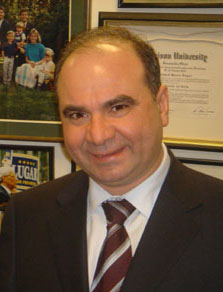Zurab Zhvania facts for kids
Quick facts for kids
Zurab Zhvania
|
|
|---|---|
|
ზურაბ ჟვანია
|
|
 |
|
| 4th Prime Minister of Georgia | |
| In office 17 February 2004 – 3 February 2005 |
|
| President | Mikheil Saakashvili |
| Preceded by | Office established; Himself as the State Minister of Georgia |
| Succeeded by | Mikheil Saakashvili (Acting) |
| State Minister of Georgia | |
| In office 23 November 2003 – 17 February 2004 |
|
| President | Nino Burjanadze (Acting) Mikheil Saakashvili |
| Preceded by | Avtandil Jorbenadze |
| Succeeded by | Office abolished; himself as the Prime Minister of Georgia |
| 2nd Chairman of the Parliament | |
| In office 25 November 1995 – 1 November 2001 |
|
| President | Eduard Shevardnadze |
| Preceded by | Eduard Shevardnadze |
| Succeeded by | Nino Burjanadze |
| Member of the Parliament of Georgia | |
| In office 4 November 1992 – 5 February 2004 |
|
| General Secretary of the Union of Citizens of Georgia | |
| Personal details | |
| Born | 9 December 1963 Tbilisi, Georgian SSR, USSR (now Georgia) |
| Died | 3 February 2005 (aged 41) Tbilisi, Georgia |
| Political party | United National Movement (2004-2005) United Democrats (2002-2004) Union of Citizens of Georgia (1995-2002) Green Party of Georgia (1992-1995) |
| Alma mater | Tbilisi State University |
| Signature | |
Zurab Zhvania (Georgian: ზურაბ ჟვანია; 9 December 1963 – 3 February 2005) was a Georgian politician, who served as Prime Minister of Georgia and Speaker of the Parliament of Georgia.
Zhvania began his political career at a young age as a member of Green Party in the early 90s. In 1993, Zhvania was elected General Secretary of Eduard Shevardnadze's political party. From that point on until his death in 2006, Zhvania played an important role in Georgian politics. In 1995 he became the chairman of parliament and maintained the post until his resignation in 1999, which was followed with the discharge of other ministers whom Zhvania had suspected of corruption. In 2003, Zhvania united with other opposition leaders, mainly Burdjanadze and Saakashvili, to hold non-violent protests against the rigging of the 2003 presidential elections. This protests culminated with the resignation of Shevardnadze and the ascendance of Saakashvili to the presidency. Zhvania became prime minister and served the post until his death in 2005.
Early life
Zhvania was born in Tbilisi into the family of Besarion Zhvania, an ethnic Georgian, and Rema Antonova, of mixed Jewish and Armenian ancestry, both physicists working at the Tbilisi Institute of Physics. In 1985 he graduated from the Faculty of Biology of the Tbilisi State University. He worked at the university through 1992. In 1993 he married Nino Kadagidze, who owned a book store with English language books in Tbilisi. They had a son and two daughters: Elisabeth, Besarion and Anna. Zhvania spoke Georgian, English, German and Russian.
Career
Zhvania entered national politics in 1988. Between 1988 and 1990, Georgia's Green Party, which Zhvania co-chaired, was one of a number of opposition groups that took part in the country's drive to regain its independence. In September 1991 his party joined the opposition to the first post-Soviet President of Georgia, Zviad Gamsakhurdia. Gamsakhurdia's violent overthrow in January 1992 resulted in Eduard Shevardnadze, the former Soviet foreign minister, coming to power a few months later. In 1992 Zhvania was elected chairman of Eastern European Greens.
Shevardnadze established the Union of Citizens of Georgia to provide a moderate centre-right grouping for reformist democrats. Zhvania joined the UGC in 1995, entering the Georgian parliament in the same year, and recruited other reformists to the party, notably Mikheil Saakashvili. In 1993, Zhvania became general secretary of Shevardnadze's party. On 25 November 1995, after the party's victory at the election, he was elected as chairman of the Georgian parliament.
However, Zhvania fell out with Shevardnadze over a corruption scandal and resigned as speaker on 1 November 2001. He and Saakashvili also left Shevardnadze's party. In 2002, he established and chaired a new party, called the United Democrats.
Zhvania had a wife and three children, and in addition to his native Georgian, he spoke Armenian, Hebrew, English, German, and Russian. Zurab Zhvania is the only Georgian Prime Minister to have died while in office.
November elections

The parliamentary elections of 2 November 2003 were widely condemned by local and international observers as being grossly rigged by the government. In response, Zhvania and other opposition figures called for mass protests against Shevardnadze. Two weeks of massive popular protests followed, forcing Shevardnadze's resignation on 23 November. He was replaced on an interim basis by Zhvania's successor as parliamentary speaker, Nino Burjanadze. Zhvania himself became a minister in the transitional government prior to fresh presidential elections held on 4 January 2004, which were won by Saakashvili.
Prime minister
In February 2004 according to the proposal of President Saakashvili Zhvania was elected as Prime Minister by the Parliament of Georgia. He led a young reformist cabinet with 15 members with an average age of 35 years. With his cabinet Zhvania was seen as a moderate counterweight to the "radical" attitudes of President Saakashvili. He also was a key figure in the talks on the separatist republics of Abkhazia and South Ossetia. Controversial was Zhvania's role during the privatisations in Georgia, when he took over all final decisions, while the competent ministers of economy had to be changed three times within two years. Experts also criticized his role in the sale of the port of Batumi and of 16 ships of the Georgian Black Sea fleet.
Death
Zhvania died early in the morning of 3 February 2005 from what officials claimed was carbon monoxide poisoning caused by an inadequately ventilated gas heater.
See also
 In Spanish: Zurab Shvania para niños
In Spanish: Zurab Shvania para niños

